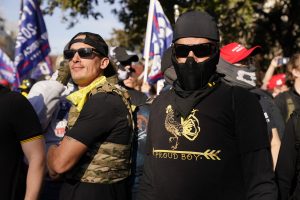In early February the Canadian government updated its list of terrorist organizations. Thirteen new groups were added to the list, which is comprised mostly of Islamic extremist and white supremacist groups. One new addition to the list — the Proud Boys — has also begun developing a significant presence in Australia. This has come due to the collapse of other ultra-nationalist groups in the country and the coalescing around this new group, fueled by the de facto endorsement of then-U.S. President Donald Trump during the presidential debates leading up to last November’s election.
The presence of the group has been noticeable at anti-lockdown protests in Australia, in response to conditions set to suppress the COVID-19 pandemic. They have also begun threatening and intimidating people in their homes and at their workplaces. As a result, the opposition Labor Party has been pushing for Australia to follow Canada’s lead and declare the group a terrorist organization. Australia is unique among its Five Eyes allies — the intelligence sharing network that also includes the United States, United Kingdom, Canada, and New Zealand — in not designating any white supremacist groups as terrorists.
Although the Proud Boys have adopted white supremacy — or “Western chauvinism” as they inaccurately describe it — as a motivating ideology, the group’s origins lie in a different form of chauvinism. Most of the media attention the group has received has either ignored or only mentioned this is passing, but acknowledging the Proud Boys as primarily a male supremacist group is essential to understanding the threat they — and like-minded groups — pose to Australian society.
There has always been a considerable overlap between white supremacy and male supremacy. While white supremacist groups haven’t been exclusively male — and often receive support from women — they are usually dominated and led by men. Men who are attracted to authoritarianism also have a tendency to embody these traits of power and control in their personal lives. The glorification of a masculine “virility” and hierarchical gender roles was central to the fascist movements in Europe during the early-mid 20th century.
Modern day movements with similar worldviews have found a powerful recruitment and propaganda tool with the internet. The loose web of platforms known as the “manosphere” attracts and radicalizes men with vicious ideas about women, and spreads tactics to exert male dominance. These tactics include orchestrating online harassment of prominent female public figures and journalists. It is important to note that these platforms don’t just intersect with other hateful ideologies like white supremacy, but they actually drive them.
Male supremacists tend to have a strict zero-sum understanding of human interaction. They display a profound sense of grievance and victimhood that women have been able to make advances with their rights and social capabilities, feeling this has come at their expense. Added to this, they consider laws and social norms that seek to set behavioral standards for men to be unfair and oppressive. There’s a sense that men cannot — and should not — be expected to be non-violent. The household, especially, is deemed a space where their absolute authority needs to be respected.
Domestic abuse is humanity’s primary security threat, yet we don’t consider it in this way. When we think of terrorist threats we tend to look for acts of organized or individual mass violence. A dispersed form of violence like domestic abuse we just dismiss as the bad temper of a particular man; we don’t recognize the worldview that motivates men to exert their social dominance in this manner. We certainly don’t consider their potential to be radicalized by online platforms.
Identifying and pinpointing this kind of threat isn’t easy because male supremacy is so nebulous. One doesn’t need to be an active member of the Proud Boys to embody bits and pieces of their ideology. Male supremacy may only appear in certain social contexts, making it easy to infuse into everyday life, and of course it already has a number of traditional social norms and institutional biases that protects it from being designated a clear and obvious threat in the way Australia has done with Islamic extremism.
Unfortunately, this undermines the vigilance required to guard institutions against its influence. Due to an astonishing lack of interest by the public, politicians, and the courts themselves, male supremacist ideas have been able to make significant inroads into the family court. These courts — and their related social services — have come to see their role as protecting a perceived “fathers’ rights” over child welfare, making it now incredibly difficult for women to protect children from dangerous men, and undermining both domestic law and international conventions.
This should present a serious warning that the state is easily susceptible to ideological capture by ideas that present a significant danger to the Australian public. Of course, there is an obvious whole-of-society effort required to combat these insidious and often deeply ingrained worldviews. But Australia following Canada’s lead and designating the Proud Boys a terrorist organization would go some way to recognizing male supremacy not just as a driver of other extremist ideologies, but a national security threat in itself.

































